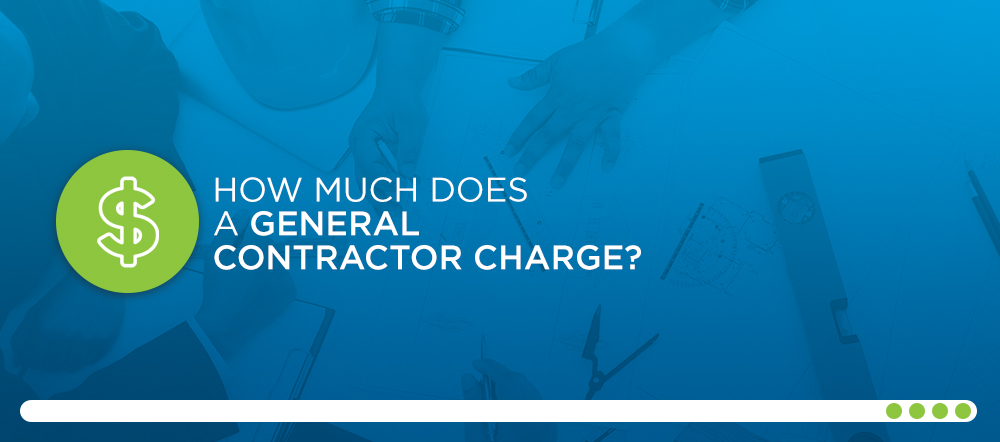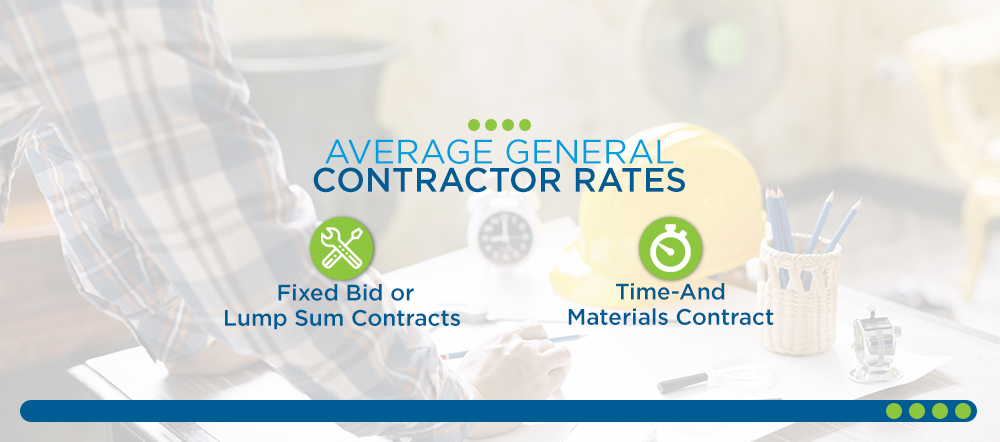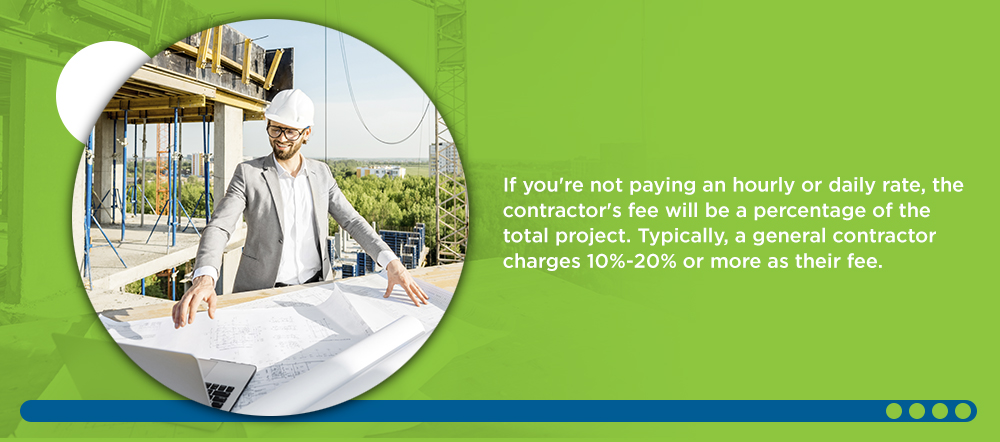
How Much Does a General Contractor Charge?
When considering hiring a contractor for a home project or renovation, you
may have a whirlwind of questions running through your mind. How much does
a general contractor cost per hour? How much does it cost to get an
estimate? What factors could influence the final price of your project?
Finding a contractor who will handle your job responsibly and charge you a
fair rate can feel like a quest. If you arm yourself with knowledge about
average general contractor costs and take a look at some price lists,
you're sure to discover a partner you can turn to with your current and
future construction projects.

Average General Contractor Rates
The cost to hire a general contractor can start as low as $250 and increase
to $58,000 or more for a complete remodel. General contractor rates depend
on many factors and the pricing model a particular business uses. Things
like labor, materials and business expenses can also vary widely by area
and project type. Two of the more common pricing models you'll encounter
include fixed bid or lump sum contracts and time-and-materials contracts:
Fixed Bid or Lump Sum Contracts
In a lump sum contract, the contractor calculates the hard costs associated
with a project upfront and includes them in the contract. In other words,
the price quoted is the price you pay. If you want this kind of payment
agreement, you'll likely have to pay for a quote. It can take a lot of time
for a contractor to determine all the hard costs for every aspect of a
project, especially if it involves working with subcontractors.
To avoid wasting time mapping out pricing for a customer who will
ultimately go with another company, most contractors will not use a fixed
bid pricing model. Of course, fixed-price bids may still be subject to
change if the scope of work does. For example, if the contractor thought
something needed a minor repair, and then discovers major water damage and
a need for total replacement, you'll likely receive a change order that
includes the cost of the additional work.
Time-And-Materials Contract
The initial bid for a time-and-materials contract is subject to change. In
this case, your contractor will charge a labor rate plus the cost of
materials. This offer is more common than a fixed bid. It is potentially
riskier if your project ends up taking longer than estimated. Many
contractors using this model will charge a minimum fee and markups for
materials. You have a better chance of a higher-quality outcome with this
type of project because the contractor isn't motivated to use substandard
materials to make more profit off a lump sum.
How Much Do Contractors Charge for Labor?
Pricing out the total cost for a construction project can be difficult
without knowing how much your contractor will charge for labor. Most
contractors charge one all-inclusive fee for labor, employees, business
expenses and a profit. These fees can surprise some homeowners expecting an
hourly rate similar to that of a handyman.
Any reputable contractor runs a full-time business with many expenses. Your
contractor has invested heavily in their business, buying specialized tools
and vehicles. They also require business insurance and a valid general
contractor's license. Any uninsured, unlicensed contractor is probably not
one you want to work on your home. A respectable contractor has studied and
trained for many years to become capable of managing a construction project
from beginning to end. Their line of work requires many unique skills, such
as:
- Setting a project timeline and schedule.
- Hiring and supervising employees and specialized subcontractors.
- Purchasing and scheduling deliveries of materials and supplies.
- Acquiring the necessary permits.
- Making and discussing project plans and adjusting them as needs change.
For these reasons, your average contractor is not charging an hourly rate
for their labor. If you're considering a general contractor and see a cost
per hour outlined in the quote, it may be a sign of an unreliable
contractor. First, hourly rates can easily be manipulated. A five-hour job
can quickly turn into 10 when a dishonest contractor is motivated to earn a
higher fee. If you're unfamiliar with how long the project should take, you
may not even notice that you overpaid for labor.
Second, if you've ever worked with a contractor before, you might know how
hard it is to estimate how many hours a project will take. When it comes to
tearing out existing materials, it's impossible to see what you're dealing
with until it starts coming out. For example, when removing an existing
floor covering before installing a new one, your contractor might discover
another layer of tile beneath the top layer, which can double the removal
time.
If you do find a general contractor with an hourly rate, it will probably
be between $50-$100 per hour. It's more common to find contractors who
charge at a daily rate. General contractors will likely cost between
$300-$500 per day for their own labor and $150-$250 per day for each helper
or laborer. This fee also covers other business expenses. You won't
typically see a quote or final bill with separate line items for labor and
additional administrative costs. Generally, a small general contractor's
fee is all-inclusive.
It's helpful to note that in California, the hourly wage for a construction
employee is above the national average. In our state, construction workers
make an
average of $38.27 per hour
. While your contractor likely won't charge you by the hour, they do pay
employees by the hour. You can expect a rate that will cover such a salary
for themselves and employees, plus overhead. If a project takes roughly 10
hours, your general contractor might take around $383 in income, plus extra
to cover overhead for equipment, vans, laborers, insurance and other
business expenses.

General Contractor Costs by Project
If you're not paying an hourly or daily rate, the contractor's fee will be
a percentage of the total project. Typically, a general contractor charges
10%-20% or more as their fee. That fee is all-inclusive, meaning you're
paying for the contractor to manage the project, team and any
subcontractors. It will also be enough to cover business expenses and turn
a profit. The percentage they charge may depend on the size of the project,
or it may be a standard percentage for every project.
For example, the
average cost to construct
a single-family home is around $296,652. Given that price, the general
contractor's fee would be an additional $29,665-$59,330. How much would a
contractor cost for a smaller project? One of the more inexpensive jobs you
might hire a contractor for is installing drywall. The average price is
around $1,700, plus a fee of $170-$340.
The total cost of your project depends on factors such as the scope of
work, size of the project and project type. A repair to an existing
structure is usually the least labor- and equipment-intensive. Replacing
materials will cost a bit more. A renovation or custom build will cost
significantly more.
You can also estimate a project by its square footage. Based on some
average costs for projects of similar size, you might expect to pay:
- Around $5,438 for a project less than 500 square feet.
- Around $6,993 for a project 500 square feet to 1000 square feet.
- Around $17,207 for a project 1,000 square feet to 1,500 square feet.
- Around $56,110 for a project 1,500 square feet to 2,000 square feet.
The type of project can also influence the cost. Some projects need
electrical wiring or plumbing, while others only need some carpentry. An
upscale renovation will cost more than a midrange renovation. Here are some
projects you might hire a general contractor for, and some pricing guides
based on the average costs associated with those projects:
-
Remodeling a garage:
$740-$2,830
-
Building a shed:
$1,500-$15,000
-
Remodeling your whole house:
$2,000-$25,000
-
Building a garage:
$4,500-$80,000
-
Remodeling a basement:
$5,000-$70,000
Of course, project costs can also vary by region and town. Here is an
overview of some
average costs of remodels
in the Pacific for 2019, including general contractor's fees:
-
Deck addition:
$16,511
-
Minor kitchen remodel:
$24,950
-
Major kitchen remodel:
$72,513
-
Bath remodel:
$23,548
-
Bath addition:
$55,051
-
Backyard patio:
$63,109
One last question you might want to consider: What do general contractors
charge upfront? While the answer can depend on your circumstances,
California law states a contractor cannot ask for
more than 10% or $1,000 down
, whichever is less. The notable exception is if the contractor has filed a
blanket performance and payment bond, which you can find out by checking
their license.

How to Get a Quote From a Contractor
Once you have a general sense of what your project could cost and what a
trustworthy contractor will charge for their labor, you're well-equipped to
begin requesting estimates. How many contractor quotes should you get?
California's Contractors State License Board (CSLB) recommends always
seeking at least three bids for the same project from local contractors.
While understanding the general costs associated with projects like yours
can be helpful, there are often factors specific to your job that influence
the price and make it hard to compare to national or regional averages.
Getting three or more contractors' opinions can give you a sense of what
those considerations might be. You'll also be able to tell if one
contractor is significantly more expensive than the other two, or vice
versa. Of course, a particularly inexpensive quote can be as concerning as
a high estimate. Estimates that sound too good to be true likely are, and
you'll end up paying for inferior handiwork and materials.
To get a quote, you should start with a detailed project description.
Emailing several contractors asking for a kitchen remodel will likely yield
vastly different quotes. Contractors need to know what your project entails
— floor replacement, electrical work, lighting and new appliances is a very
different project than installing new cabinets.
You'll also probably need to include some specifications for the room or
area your plan will encompass. The more detailed you can be, the more
satisfied you'll be with the quotes you receive and your final result. Some
items to include in your initial request might be:
- An introduction to the project
- Your goals, in as much detail as possible
- Your ideal timeline or deadline
- A set budget and level of flexibility
- Potential landscaping obstacles for outdoor work
- Dimensions and features of the room, home or intended site
- Any areas of concern or emphasis
How much do contractors charge for estimates? Sometimes requesting bids or
estimates is free. Other times, contractors will charge between $50 and
$1,000 for an estimate, depending on the project's size. As you receive
offers from several contractors, it's a good idea to compare more than
price. As you vet candidates, take these steps to find the right partner
for your job:
1. Compare estimates and flag any quotes that seem too high or too low.
2. Read online reviews and business ratings
from a trusted source.
3. Meet with the contractor face-to-face to look at the job site together,
discuss the project and determine if the contractor will be a good fit.
4. Verify the contractor's insurance, and check that they have a valid
state license.
5. Ask about what permits are necessary for the project and gauge how
willing the contractor is to obtain them.
6. Evaluate the contractor's portfolio and follow up with any references
provided.
7. When you ask for a formal contract, look for estimated completion dates,
payment schedules, the scope of work, an itemized material list and valid
contact information before signing.
Can You Negotiate Price With Contractors?
If you're looking to stay within a tight budget or ensure you have the most
cost-effective option, the good news is you can negotiate. However,
tactfulness is critical. Remember that your contractor is providing a
highly skilled service and running a business with legitimate expenses. A
few strategies can help you get a fair price without cutting corners.
First, inform your candidates that you are requesting bids from several
contractors. Your honesty can naturally drive prices lower since
contractors know they will be competing on price.
You can also ask for advice on how to keep the cost of the project down.
Maybe you'll receive suggestions that involve keeping the layout the same
to avoid additional electrical and plumbing costs. You might also be able
to find more affordable materials that offer a similar look and durability
to the original plans. Asking how you can curb expenses lets your
contractor know that you're price-conscious, which may prompt additional
cost-saving suggestions.
If you're handy, you can also suggest doing part of the project yourself.
Doing your own painting or landscaping while relying on the contractor for
more technical work can significantly reduce the cost. Since the
contractor's fee is often a percentage of labor and materials, providing
your own workmanship and supplies can be a useful strategy to bring down a
contractor's fee without asking them to lower their rate.

Find a General Contractor in Your Area
If you're looking for contractors in California, the Business Consumer
Alliance offers an excellent resource. Our Contractor Link program will
connect you with contractors based on your specific needs. We make it easy
to find out how much a contractor costs in your area. All you have to do is
fill out our form and provide details for your project, and we'll match you
with several of our thousands of trusted contractors. They'll personally
reach out to you with their offers.
When you find a contractor through the BCA, you'll connect with companies
who are:
- Properly licensed, insured and bonded.
- Established in your area.
- Vetted by the BCA and highly rated by fellow consumers.
- Ethical and reliable.
Ready to compare your options? Fill out our simple
contractor match-making form
and begin receiving offers within 24 hours.